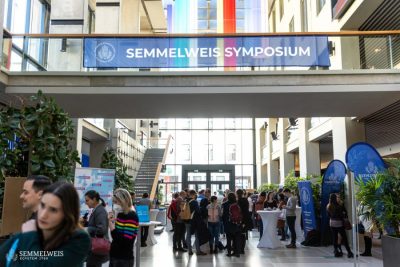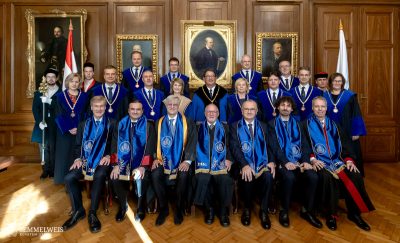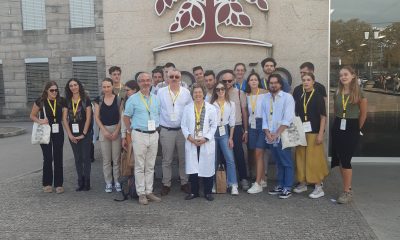Hungarian and foreign peers, colleagues and students held presentations and celebrated Dr. Tivadar Tulassay at a scientific meeting held in his honor on the occasion of his 70th birthday, in the great hall of the Nagyvárad tér Theoretical Building (NET). Semmelweis University’s rector emeritus, who is a professor as well as professor emeritus and former director of the 1st Department of Pediatrics, talked in his closing speech about the importance of honesty and knowledge, and called on participants to seek wisdom.
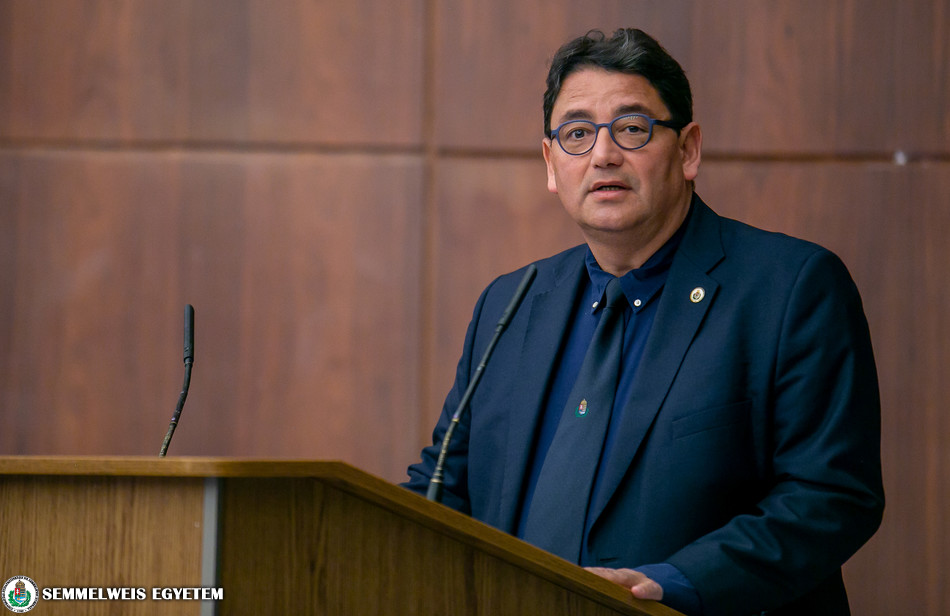 A great scientist, an educator who established a new school of thought, an outstanding university leader, a patron of the arts, a real renaissance man is celebrating his birthday today, who grew from a curious child into a curious adult, from a student to a true master over the past decades, emphasized rector Dr. Béla Merkely in his opening speech. He pointed out that of his 70 years so far, Dr. Tivadar Tulassay spent 46 years in patient care, including 45 years at Semmelweis University, and was active in healing, education and research. The strength of Semmelweis University stems primarily from the world-class human resources and the knowledge that has been accumulated here. This strength and knowledge, which is passed from generation to generation, is what keeps the university being the flagship of health care, medical and health sciences training and research in Hungary. For nine years [from 2003 to 2012], Dr. Tivadar Tulassay was not just a crew member, but the captain of this ship, said Dr. Béla Merkely, who stressed that the results of his constant hard work are outstanding not only in intellectual and scientific areas, but in the university’s infrastructural developments as well. “As the current rector of the university, I have defined the mission of the university, which celebrates its 250th anniversary this year, along the path set by Tivadar Tulassay: that of tradition, knowledge and humility,” declared Dr. Béla Merkely. Referring to the former rector, he quoted the words of Seneca: “… a great man always stays the same, he is constant. This is the only true greatness. He calls our attention to him, and we see how his light shines upon the darkness.” He also thanked Dr. Tulassay’s family for the support they have given to Semmelweis University through the professor.
A great scientist, an educator who established a new school of thought, an outstanding university leader, a patron of the arts, a real renaissance man is celebrating his birthday today, who grew from a curious child into a curious adult, from a student to a true master over the past decades, emphasized rector Dr. Béla Merkely in his opening speech. He pointed out that of his 70 years so far, Dr. Tivadar Tulassay spent 46 years in patient care, including 45 years at Semmelweis University, and was active in healing, education and research. The strength of Semmelweis University stems primarily from the world-class human resources and the knowledge that has been accumulated here. This strength and knowledge, which is passed from generation to generation, is what keeps the university being the flagship of health care, medical and health sciences training and research in Hungary. For nine years [from 2003 to 2012], Dr. Tivadar Tulassay was not just a crew member, but the captain of this ship, said Dr. Béla Merkely, who stressed that the results of his constant hard work are outstanding not only in intellectual and scientific areas, but in the university’s infrastructural developments as well. “As the current rector of the university, I have defined the mission of the university, which celebrates its 250th anniversary this year, along the path set by Tivadar Tulassay: that of tradition, knowledge and humility,” declared Dr. Béla Merkely. Referring to the former rector, he quoted the words of Seneca: “… a great man always stays the same, he is constant. This is the only true greatness. He calls our attention to him, and we see how his light shines upon the darkness.” He also thanked Dr. Tulassay’s family for the support they have given to Semmelweis University through the professor.
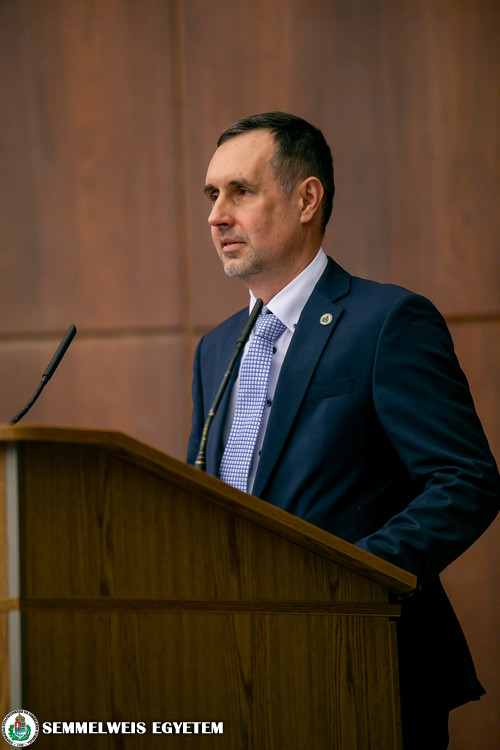 “Today, we are here to celebrate a professor that is respected by many, who was a teacher to many people, and to greet an excellent peer,” said Dr. Attila Szabó, Vice-Rector for Clinical Affairs, director of the 1st Department of Pediatrics and the event’s host, in his greeting. Integrity, knowledge, tolerance: these basic principles guided the life of Dr. Tivadar Tulassay so far and define his actions even to this day; this is what he radiated toward his peers and what he passed on to his students as well, he stressed. His career had a significant effect, and to this day affects pediatrics, scientific life and the training of doctors in Hungary and around the world. He published several important and enduring scientific findings in the fields of neonatology and pediatric nephrology, of which Dr. Attila Szabó highlighted the observation that described the symptoms and changes that appear already at a young age in premature births that had late-stage complications. Dr. Tivadar Tulassay’s entire life has been accompanied by scientific curiosity, the posing of questions and the seeking of answers. He was a tough, consistent student, and then teacher, but the curious child remained within him all the time, he said. Dr. Attila Szabó noted that for a quarter century now, he has been lucky to have learned from professor Tulassay and to call him his teacher; a true teacher who makes you curious and shows you all the possible paths. The vice-rector and department director thanked Dr. Tulassay’s family as well, including his loving wife, his children and grandchildren, for the environment of support and harmony that they have given him throughout his life.
“Today, we are here to celebrate a professor that is respected by many, who was a teacher to many people, and to greet an excellent peer,” said Dr. Attila Szabó, Vice-Rector for Clinical Affairs, director of the 1st Department of Pediatrics and the event’s host, in his greeting. Integrity, knowledge, tolerance: these basic principles guided the life of Dr. Tivadar Tulassay so far and define his actions even to this day; this is what he radiated toward his peers and what he passed on to his students as well, he stressed. His career had a significant effect, and to this day affects pediatrics, scientific life and the training of doctors in Hungary and around the world. He published several important and enduring scientific findings in the fields of neonatology and pediatric nephrology, of which Dr. Attila Szabó highlighted the observation that described the symptoms and changes that appear already at a young age in premature births that had late-stage complications. Dr. Tivadar Tulassay’s entire life has been accompanied by scientific curiosity, the posing of questions and the seeking of answers. He was a tough, consistent student, and then teacher, but the curious child remained within him all the time, he said. Dr. Attila Szabó noted that for a quarter century now, he has been lucky to have learned from professor Tulassay and to call him his teacher; a true teacher who makes you curious and shows you all the possible paths. The vice-rector and department director thanked Dr. Tulassay’s family as well, including his loving wife, his children and grandchildren, for the environment of support and harmony that they have given him throughout his life.
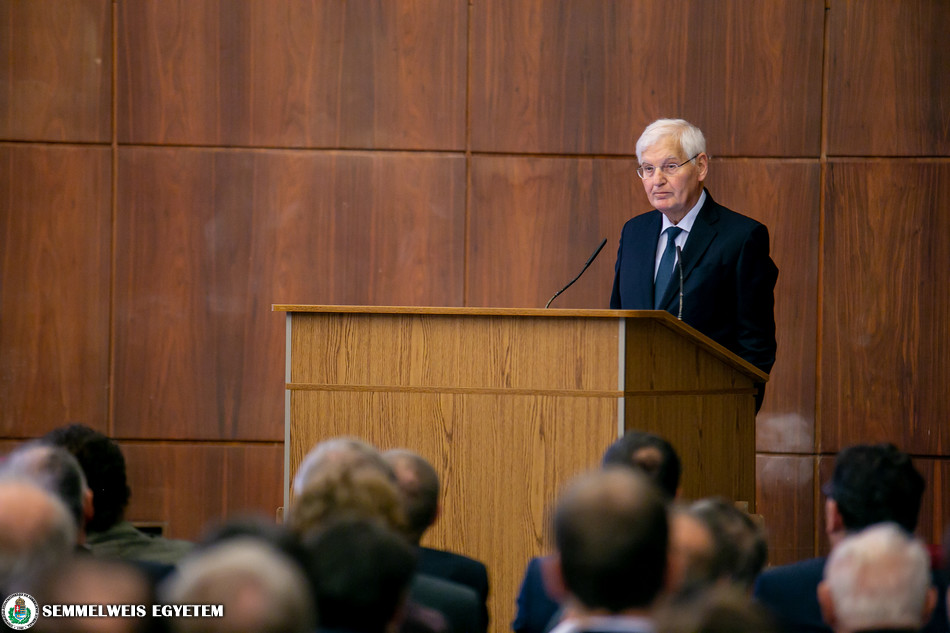 Dr. Matthias Brandis, Professor of Pediatrics at the University of Freiburg, and Doctor Honoris Causa of Semmelweis University, held a presentation titled “The impact of molecular genetics on the new understanding of diseases in children,” in which he provided an overview of how during the last 40 years, the understanding and treatment of pediatric diseases has changed. He took an example of kidney diseases, a field of research Dr. Tulassay focused on, and pointed out that by identifying the molecular genetics of the diseases, treatments have become much more effective over the past decades. He recalled that his friendship and collaboration with Dr. Tulassay goes back several decades, and pointed out that the professor has more than 400 publications to his name in scientific journals, and that he continues to publish to this day.
Dr. Matthias Brandis, Professor of Pediatrics at the University of Freiburg, and Doctor Honoris Causa of Semmelweis University, held a presentation titled “The impact of molecular genetics on the new understanding of diseases in children,” in which he provided an overview of how during the last 40 years, the understanding and treatment of pediatric diseases has changed. He took an example of kidney diseases, a field of research Dr. Tulassay focused on, and pointed out that by identifying the molecular genetics of the diseases, treatments have become much more effective over the past decades. He recalled that his friendship and collaboration with Dr. Tulassay goes back several decades, and pointed out that the professor has more than 400 publications to his name in scientific journals, and that he continues to publish to this day.
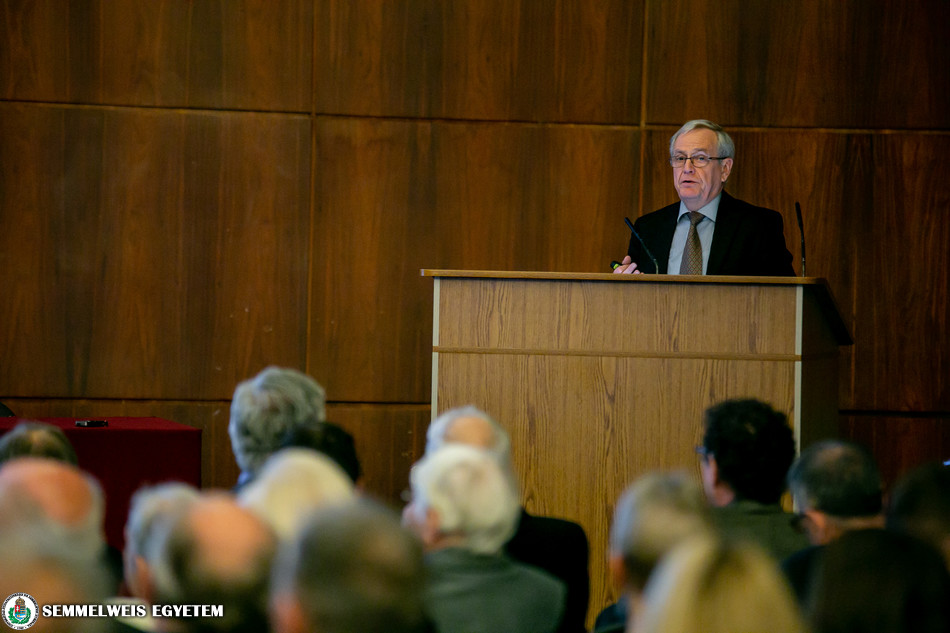 Dr. Wolfgang Rascher, Professor of Pediatrics at the University of Erlangen-Nurnberg, held a presentation focusing on sodium and volume regulation and how the scientific understanding of the topic has changed over the past 70 years. Dr. Rascher, who worked together with Dr. Tulassay in Heidelberg for a year and a half in 1985–1986 and co-authored 32 papers with the professor in international journals, recalled how over time new research discovered that sodium is stored in polyanions, the role of hormonal regulation, and the concept of skin sodium storage. He highlighted the significant role that Dr. Tivadar Tulassay played in these findings.
Dr. Wolfgang Rascher, Professor of Pediatrics at the University of Erlangen-Nurnberg, held a presentation focusing on sodium and volume regulation and how the scientific understanding of the topic has changed over the past 70 years. Dr. Rascher, who worked together with Dr. Tulassay in Heidelberg for a year and a half in 1985–1986 and co-authored 32 papers with the professor in international journals, recalled how over time new research discovered that sodium is stored in polyanions, the role of hormonal regulation, and the concept of skin sodium storage. He highlighted the significant role that Dr. Tivadar Tulassay played in these findings.
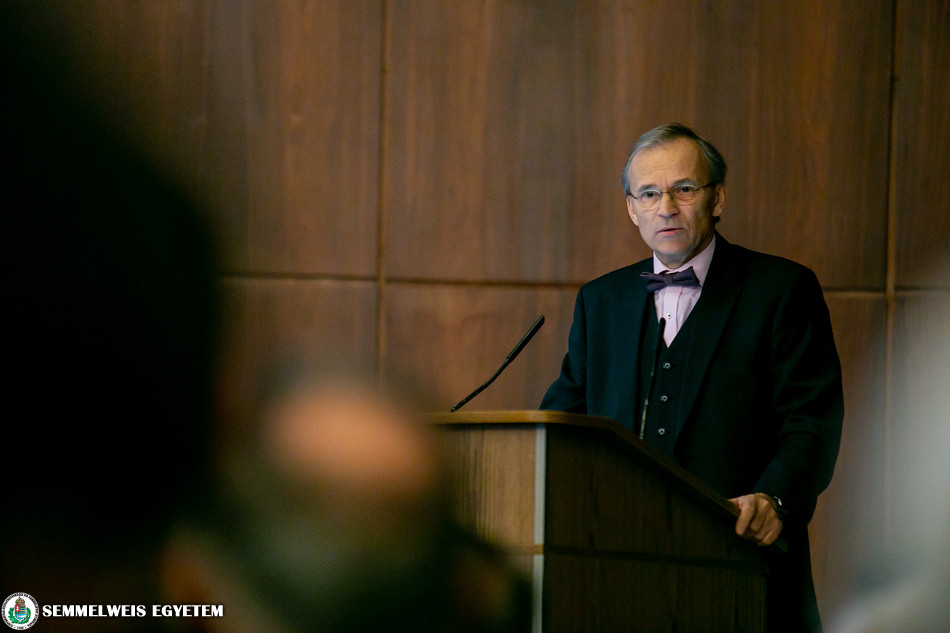 Dr. István Seri, research professor at the 1st Department of Pediatrics and honorary professor of Semmelweis University, focused in his speech on his work together with Dr. Tivadar Tulassay in the areas of developmental cardiovascular and renal physiology. He recalled that the two of them started together at the 2nd Department of Pediatrics and then at the 1st Department of Obstetrics. “I learned from our work and friendship that one should follow a concept, and not miss an opportunity when we have an observation or finding but to follow where it leads,” he said. He also praised Dr. Tivadar Tulassay for leading a life based on honesty, curiosity and humility, and noted how much he inspired his students and colleagues.
Dr. István Seri, research professor at the 1st Department of Pediatrics and honorary professor of Semmelweis University, focused in his speech on his work together with Dr. Tivadar Tulassay in the areas of developmental cardiovascular and renal physiology. He recalled that the two of them started together at the 2nd Department of Pediatrics and then at the 1st Department of Obstetrics. “I learned from our work and friendship that one should follow a concept, and not miss an opportunity when we have an observation or finding but to follow where it leads,” he said. He also praised Dr. Tivadar Tulassay for leading a life based on honesty, curiosity and humility, and noted how much he inspired his students and colleagues.
 Dr. Tamás Machay, retired professor of the 1st Department of Pediatrics, held a presentation titled “Tivadar Tulassay and the past 40 years of neonatology in Hungary,” in which he recalled various memories from his time spent with Dr. Tulassay in the period starting from 1975. They started working together at the 2nd Department of Pediatrics, under Dr. Ödön Kerpel-Fronius, from whom they learned many things, primarily patience and having a wide perspective, he said, adding that Dr. Tivadar Tulassay immediately became interested in neonatology as well, in addition to general pediatrics. In the years between 1970–1975, infant mortality was quite high in Hungary due to the roughly 10% rate of premature births, and this was when it was decided that neonatal intensive care units should be established in Hungary, which happened starting in 1976. Between 1976 and 1983, infant mortality fell by half, and then was halved again by 1996–2006 and today has reached the standard European level, he said.
Dr. Tamás Machay, retired professor of the 1st Department of Pediatrics, held a presentation titled “Tivadar Tulassay and the past 40 years of neonatology in Hungary,” in which he recalled various memories from his time spent with Dr. Tulassay in the period starting from 1975. They started working together at the 2nd Department of Pediatrics, under Dr. Ödön Kerpel-Fronius, from whom they learned many things, primarily patience and having a wide perspective, he said, adding that Dr. Tivadar Tulassay immediately became interested in neonatology as well, in addition to general pediatrics. In the years between 1970–1975, infant mortality was quite high in Hungary due to the roughly 10% rate of premature births, and this was when it was decided that neonatal intensive care units should be established in Hungary, which happened starting in 1976. Between 1976 and 1983, infant mortality fell by half, and then was halved again by 1996–2006 and today has reached the standard European level, he said.
 Dr. Miklós Kellermayer, the director of the Department of Biophysics and Radiation Biology, in his presentation titled “Force and interaction in biomolecular and complex systems,” drew a parallel between how a human life twists and turns in space and time and how DNA, the building block of life, also appears to us as a thread that twists and turns. What makes a DNA molecule really interesting is the interactions it enters into with various proteins, just like how the thread of our lives is made interesting by how we interact with our environment, our co-workers, our loved ones, our creator and with the world he created, Dr. Miklós Kellermayer pointed out, adding that for him, his meeting with Dr. Tivadar Tulassay was such a point. He recalled that he was honored to support the work of the former rector as vice-rector for science. He noted that Dr. Tivadar Tulassay sets an example in many aspects, but for him the noblest one is his internal intellectual and spiritual compass, which points to the sky, to God, to the Creator. In his presentation, Dr. Miklós Kellermayer also provided a brief overview of the current research involving the nanomechanics of DNA viruses.
Dr. Miklós Kellermayer, the director of the Department of Biophysics and Radiation Biology, in his presentation titled “Force and interaction in biomolecular and complex systems,” drew a parallel between how a human life twists and turns in space and time and how DNA, the building block of life, also appears to us as a thread that twists and turns. What makes a DNA molecule really interesting is the interactions it enters into with various proteins, just like how the thread of our lives is made interesting by how we interact with our environment, our co-workers, our loved ones, our creator and with the world he created, Dr. Miklós Kellermayer pointed out, adding that for him, his meeting with Dr. Tivadar Tulassay was such a point. He recalled that he was honored to support the work of the former rector as vice-rector for science. He noted that Dr. Tivadar Tulassay sets an example in many aspects, but for him the noblest one is his internal intellectual and spiritual compass, which points to the sky, to God, to the Creator. In his presentation, Dr. Miklós Kellermayer also provided a brief overview of the current research involving the nanomechanics of DNA viruses.
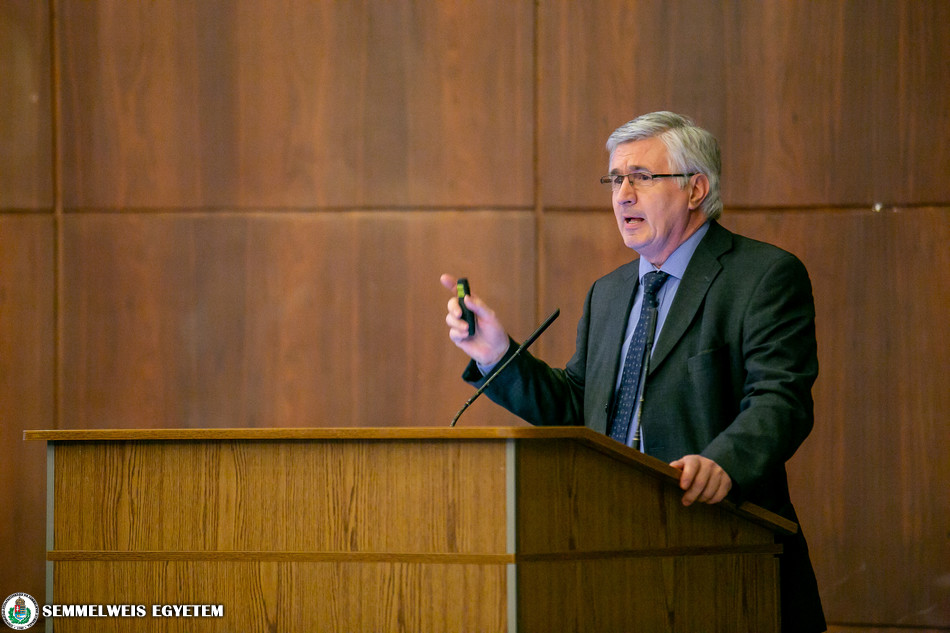 Dr. András Szabó, professor at the 2nd Department of Pediatrics, in his speech titled “Careers and meetings,” said that he considers it a divine gift that several “accidental” meetings brought him together with Dr. Tulassay over the course of his career. When he was a second-year student, Tivadar Tulassay, then a fifth-year student, was the demonstrator of his physiology group, and later they also met at Heidelberg, where Dr. Tulassay was on a Humboldt scholarship, while he himself was delegated there by professor Schuler. When he was defending his qualification as a candidate of sciences, one of his tough opponents was also Dr. Tulassay; later it was the professor who invited him to join the 1st Department of Pediatrics, where he was able to set up a research laboratory and then work with him as vice-director. It was also at his behest that he applied for the position of director of the 2nd Department of Pediatrics.
Dr. András Szabó, professor at the 2nd Department of Pediatrics, in his speech titled “Careers and meetings,” said that he considers it a divine gift that several “accidental” meetings brought him together with Dr. Tulassay over the course of his career. When he was a second-year student, Tivadar Tulassay, then a fifth-year student, was the demonstrator of his physiology group, and later they also met at Heidelberg, where Dr. Tulassay was on a Humboldt scholarship, while he himself was delegated there by professor Schuler. When he was defending his qualification as a candidate of sciences, one of his tough opponents was also Dr. Tulassay; later it was the professor who invited him to join the 1st Department of Pediatrics, where he was able to set up a research laboratory and then work with him as vice-director. It was also at his behest that he applied for the position of director of the 2nd Department of Pediatrics.
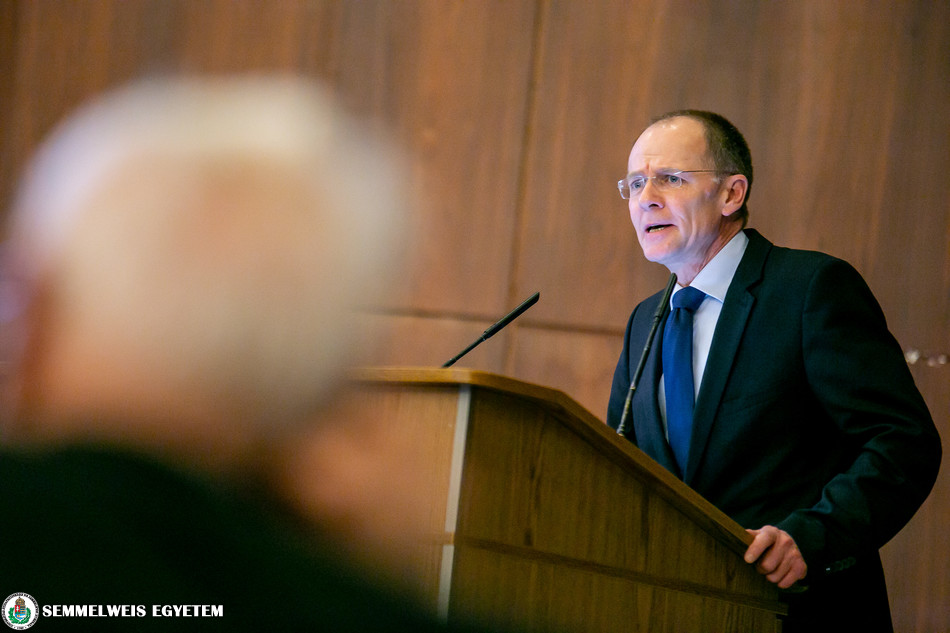 Dr. Miklós Szabó, tenured professor at the 1st Department of Pediatrics, presented the visions and realities of neonatology from the 1990s, and emphasized that both as department director and as rector, Dr. Tivadar Tulassay had a significant nationwide effect on neonatology in Hungary. The neonatal intensive care unit of the 1st Department of Pediatrics became a scientific workshop that to this day is a place where generations of neonatologists are trained, he stressed. Dr. Miklós Szabó said that they will take along with them the thought from professor Tulassay that the endpoint and goal of the activities of neonatologists is a healthy adulthood. This has oriented all of our thinking over the past 10–15 years, he added. The other important message is that research labs and patient care should be under one roof; this was a reality at the department already before translational research came into focus.
Dr. Miklós Szabó, tenured professor at the 1st Department of Pediatrics, presented the visions and realities of neonatology from the 1990s, and emphasized that both as department director and as rector, Dr. Tivadar Tulassay had a significant nationwide effect on neonatology in Hungary. The neonatal intensive care unit of the 1st Department of Pediatrics became a scientific workshop that to this day is a place where generations of neonatologists are trained, he stressed. Dr. Miklós Szabó said that they will take along with them the thought from professor Tulassay that the endpoint and goal of the activities of neonatologists is a healthy adulthood. This has oriented all of our thinking over the past 10–15 years, he added. The other important message is that research labs and patient care should be under one roof; this was a reality at the department already before translational research came into focus.
 Dr. György Reusz, professor at the 1st Department of Pediatrics, talked about the past, present and future of pediatric nephrology. He said that this field grew out of pediatrics, and one of its centers in Hungary is the 1st Department of Pediatrics. He discussed among others the development of biological therapies, immunology diagnostics and nephropathology, and noted that today they are also able to provide continuous treatment for chronic kidney failure. Dr. Tivadar Tulassay has undying merit in establishing a new school of thought and training new generations of doctors in this field as well, he stated, adding that professor Tulassay was guided in all his endeavors by the attitude that the preeminent goal is the health of the children.
Dr. György Reusz, professor at the 1st Department of Pediatrics, talked about the past, present and future of pediatric nephrology. He said that this field grew out of pediatrics, and one of its centers in Hungary is the 1st Department of Pediatrics. He discussed among others the development of biological therapies, immunology diagnostics and nephropathology, and noted that today they are also able to provide continuous treatment for chronic kidney failure. Dr. Tivadar Tulassay has undying merit in establishing a new school of thought and training new generations of doctors in this field as well, he stated, adding that professor Tulassay was guided in all his endeavors by the attitude that the preeminent goal is the health of the children.
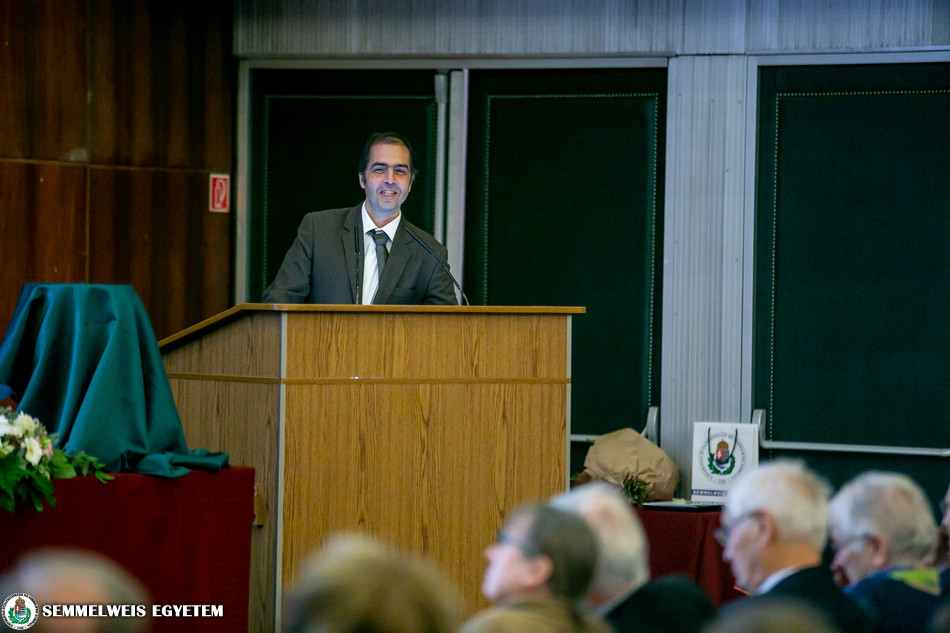 Dr. Barna Vásárhelyi, the director of the Department of Laboratory Medicine, recalled his time spent at the department’s research laboratory, and how he felt back then, while drawing a parallel between fishing and scientific research. Both require patience and faith, for example, as well as the necessary equipment, which was fully at their disposal at the department for their research. He highlighted the significance that the researchers were able to seek answers to the questions posed by clinical care, while Dr. Tivadar Tulassay, as a very inspiring director, was always there to give them new impulses. The reward of a successful researcher is wonder, the discovery of something new. He thanked Dr. Tivadar Tulassay for his joy, his perseverance, his enthusiasm and his commitment, ending his speech by noting that the starting letters of these four words in Hungarian read out the word ökle (rhodeus), which is a fish native to the Carpathian Basin.
Dr. Barna Vásárhelyi, the director of the Department of Laboratory Medicine, recalled his time spent at the department’s research laboratory, and how he felt back then, while drawing a parallel between fishing and scientific research. Both require patience and faith, for example, as well as the necessary equipment, which was fully at their disposal at the department for their research. He highlighted the significance that the researchers were able to seek answers to the questions posed by clinical care, while Dr. Tivadar Tulassay, as a very inspiring director, was always there to give them new impulses. The reward of a successful researcher is wonder, the discovery of something new. He thanked Dr. Tivadar Tulassay for his joy, his perseverance, his enthusiasm and his commitment, ending his speech by noting that the starting letters of these four words in Hungarian read out the word ökle (rhodeus), which is a fish native to the Carpathian Basin.
Following the presentations, Dr. Attila Szabó, in the name of the department’s current and former workers, the presenters, and the entire community, presented Dr. Tivadar Tulassay with a sculpture made by Mária Törley, which embodies the love of art, music and the fine arts.
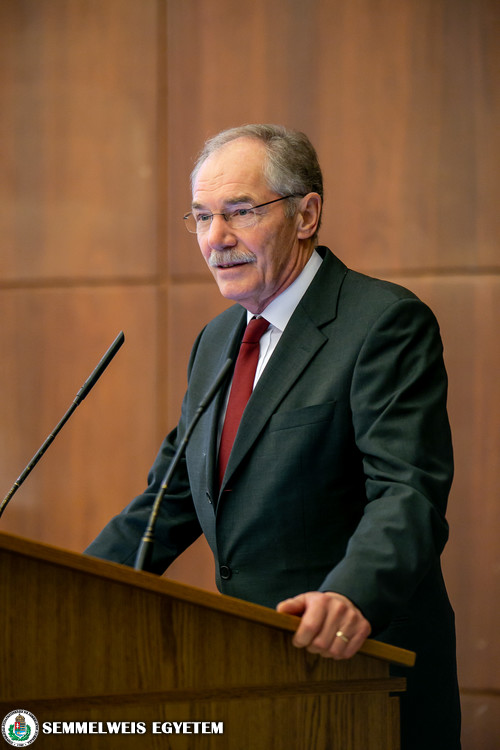 Dr. Tivadar Tulassay first thanked Dr. Attila Szabó for making him feel during the past three hours that the hall was filled with love, which can be attributed to his successor at the head of the department inviting all the dear people who came to the event, who love each other and subscribe to the same values. He spoke about two main principles: honesty and knowledge. With regard to the former, he quoted the poem Two Hexameters by Attila József: “Why should I be honest? I’ll be laid out, anyhow! / Why should I not be honest! I’ll be laid out, anyhow.” [Translation by Katalin N. Ullrich] Be honest, it is the only way! – Dr. Tulassay told the audience. He went on to talk about knowledge, quoting among others T. S. Eliot. He said that during their lives, people traverse three planes of knowledge. The first is getting to know the world, gathering information; but simply collecting information is not enough. The next level of learning, which may lead to knowledge, is getting to know myself, and how the information I collect radiates to my environment after going through me, he pointed out, adding that if someone reaches this point, then they can gather students around them. But for human life to gain meaning, said Dr. Tivadar Tulassay, the third plane of understanding is necessary, which is the discovery of what my role is, why am I on this earth. If one can ask themselves these difficult questions, then they are close to acquiring wisdom. But what characteristics do we need to reach this wisdom? “… the wisdom that comes from heaven is first of all pure; then peace-loving, considerate, submissive, full of mercy and good fruit, impartial and sincere,” he quoted from the Epistle of James. “My dear friends, it would be great if in this painfully fractured, confused world we could conduct our research in love and understanding, and if we would consider research the joy of the homo ludens and not as a race to make money, and if we sought the truth by seeking beauty too. Because what is true is always beautiful as well. If we do this, we may find wisdom. Seek wisdom!” Dr. Tivadar Tulassay said in closing.
Dr. Tivadar Tulassay first thanked Dr. Attila Szabó for making him feel during the past three hours that the hall was filled with love, which can be attributed to his successor at the head of the department inviting all the dear people who came to the event, who love each other and subscribe to the same values. He spoke about two main principles: honesty and knowledge. With regard to the former, he quoted the poem Two Hexameters by Attila József: “Why should I be honest? I’ll be laid out, anyhow! / Why should I not be honest! I’ll be laid out, anyhow.” [Translation by Katalin N. Ullrich] Be honest, it is the only way! – Dr. Tulassay told the audience. He went on to talk about knowledge, quoting among others T. S. Eliot. He said that during their lives, people traverse three planes of knowledge. The first is getting to know the world, gathering information; but simply collecting information is not enough. The next level of learning, which may lead to knowledge, is getting to know myself, and how the information I collect radiates to my environment after going through me, he pointed out, adding that if someone reaches this point, then they can gather students around them. But for human life to gain meaning, said Dr. Tivadar Tulassay, the third plane of understanding is necessary, which is the discovery of what my role is, why am I on this earth. If one can ask themselves these difficult questions, then they are close to acquiring wisdom. But what characteristics do we need to reach this wisdom? “… the wisdom that comes from heaven is first of all pure; then peace-loving, considerate, submissive, full of mercy and good fruit, impartial and sincere,” he quoted from the Epistle of James. “My dear friends, it would be great if in this painfully fractured, confused world we could conduct our research in love and understanding, and if we would consider research the joy of the homo ludens and not as a race to make money, and if we sought the truth by seeking beauty too. Because what is true is always beautiful as well. If we do this, we may find wisdom. Seek wisdom!” Dr. Tivadar Tulassay said in closing.
For the full gallery of the event, see our original Hungarian article here.
Tamás Deme, Pálma Dobozi
Translation: Tamás Deme
Photos: Attila Kovács – Semmelweis University
